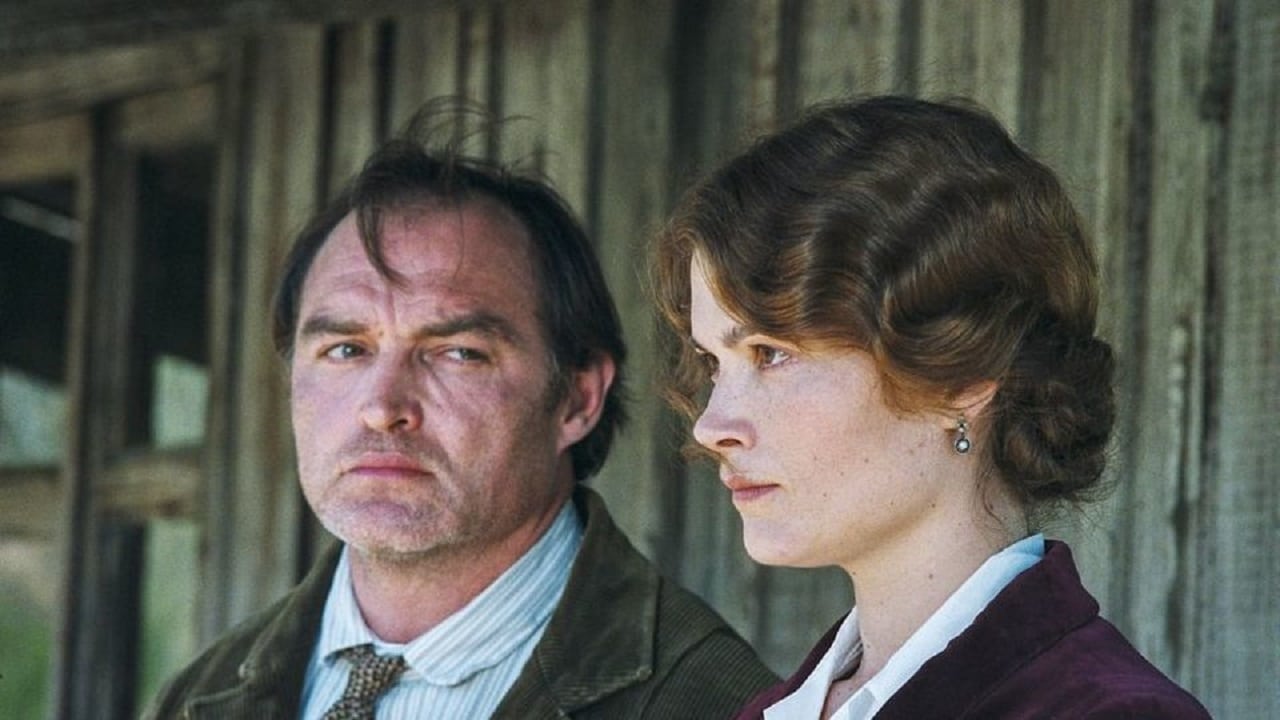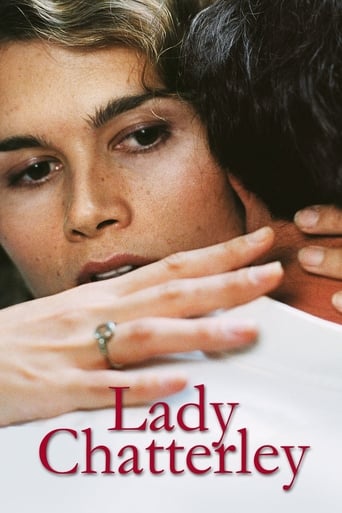

I may have heard about this film, I knew it was a costume drama or something, I didn't realise it was French or based on a less known erotic tale by D.H. Lawrence, but I was going to watch whatever. Basically in a large estate near Sheffield, Sir Clifford Chatterley (Hippolyte Girardot) who has become paralysed from the waist down after returning from the Great War. His caring young wife Lady Constance 'Connie' Chatterley (Marina Hands) is lifeless and with no self strength, and she finds a quiet hut retreat when her physician prescribes the open air. This hut is where the estate's games keeper Parkin (Jean-Louis Coullo'ch) lives and works, and what starts as an awakening with nature, pheasant chick and daffodils growing, soon gets more intense. Connie and Parkin soon begin an affair and become passionate lovers, she now feels radiant and he has opened up himself as well, the only thing stopping becoming much more is class and age difference. One of the most memorable scenes sees the lovers running naked through the woods while it is raining, making love in the mud, washing off and placing green flowers on their bodies. In the end Connie takes a trip to France with her father Sir Malcolm (Bernard Verleyand) sister, and the affair comes to a subtle end and she stays with her crippled husband. Also starring Hélène Alexandridis as Mrs. Bolton, Hélène Fillières as Hilda, Sava Lolov as Tommy Dukes, Jean-Baptiste Montagut as Harry Winterslow and Christelle Hes as Kate. Hands is really pretty with and without clothes as the free spirited Lady needing to find herself, and Coullo'ch gets his moments as her lover wanting this resolution, it is a simple enough story, the nudity does not stop you lapping up the love story, slightly long, but overall a most watchable period romantic drama. Very good!
... View MoreFirst we may talk about the general atmosphere of this remarkable movie. All sceneries are very beautiful, accurate and full of meaning: the landscapes, the interiors and the characters' clothes like we would expect in a reproduction of events which take place in mid-twenties of last century. In what concerns the plot and story we must keep always in mind that at the time most Victorian moral values still prevail and we must see the movie against this background so what wouldn't be revolutionary nowadays was revolutionary indeed at the time. This is the well told, well acted and well directed story of a woman awakening for the physical side of love life. She is the aristocratic rich wife of a no less aristocratic and rich man who is nevertheless an invalid ridden to a wheelchair for life and sexually impotent of course. This awakening begins when she sees for the first time her husband's gamekeeper naked above his waist and washing himself. She is then overwhelmed by a great psychological trouble and the ensuing uncontrollable need of meeting him again leads her to go to see him once more and finishing by surrender herself to make love with him. The first two love scenes were so quick that she doesn't get to any climax and only during the third scene where she takes a more active part does she reach a full orgasm. It's curious however (but quite in accordance with social patterns of that time) that during the first love scenes between the two the relation master-servant maintains itself before and after sex and only later does it gain a more personal and intimate nature. After the third love scene she even thanks him for it like if it had been a service rendered by him which offends him a lot. This adaptation of the second version of the literary masterpiece novel by the British writer D. H. Lawrence is a great success indeed. This novel was banned as pornographic when it was published first time and only in the sixties of last century a court declared it not pornographic according to he real difference between pornography and eroticism which exists though many people still don't know it but it's out of the scope of this review to explain. Sex is a force of nature and indeed a part of human relations and the literary or artistic works based on it can be object of aesthetic (in the broad sense) evaluation notwithstanding any possible moral evaluations which are not within the scope of a literary or a film essay.
... View MoreI went to this solely because of one review by a trusted critic elsewhere and I am very glad that my trust was not misplaced. This 3-hour French adaptation of the D.H. Lawrence novel boasts no stars I'm familiar with, is directed by someone I've never heard of, and is based on a novel I've never read -- so I went into it pretty blind. The majority of people seeing this will almost certainly be more familiar with the story than I was, so I won't go on at length; suffice it to say that the aristrocratic Lady's romance with a grounds-keeper on her crippled husband's lands (I believe he was a stonemason in the novel) starts out somewhat plodding, wrapped up in a 19th-century gauze of courtliness and tentative, unexpressed feelings, but the intensity builds with a smoothness and a sure command of film language that is completely impressive. The principal leads, Marina Hands and Jean-Louis Coullo'ch, are exemplary, the photography and camera movements natural, capturing the beauty and sensuality of both the couple and landscape without seeming over-decorous or sentimental. The extraordinary use of music is perhaps what I'll remember most; the majority of the film does not have background music, but on a few brief occasions a yearning early 20th-century post-Romantic score (reminiscent to me of Delius or Bax) soars outward; the judgment of director Ferran in her use of these rare bars of melody (by Béatrice Thiriet) to express the wordless emotions of her heroine might seem almost Spielbergian if you're just reading about them, but they show a restraint and perfect timing that far exceeds the sentimental uses that most Hollywood directors would put them to. The final moments, the discovery of the erotic, naturalistic and romantic voices all finally fused into one -- are as rapturous as any ending I've seen this year. Theatrical viewing at The Roxy (our one art-house cinema) in Burlington, late 2007.
... View MoreLush, leisurely paced movie that shows that sex is not obscene or vulgar. It's as natural as the beautiful fields and streams where the two main characters spend most of their time together. Watching them in this setting, their eventual sexual encounters feel natural and normal unlike so many movies were sex is treated as something dirty and shameful. Unfortunately, the ending just does not work. After drawing the viewer in with several long, lush, sensual scenes, the movie screeches to a halt after a short 5 minute conversation. It doesn't work and there's a few other scenes as well (the one where Lady Chatterley's waiting in her chauffeured car for her husband at the mine) that go nowhere. With a different ending and little editing, this could have been a masterpiece.
... View More